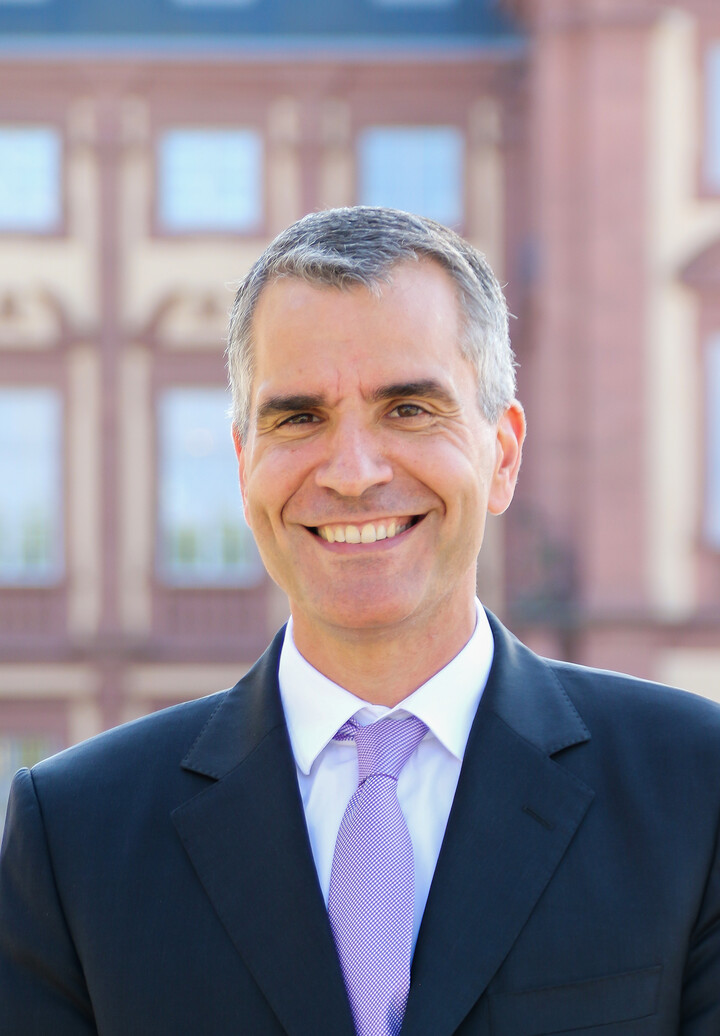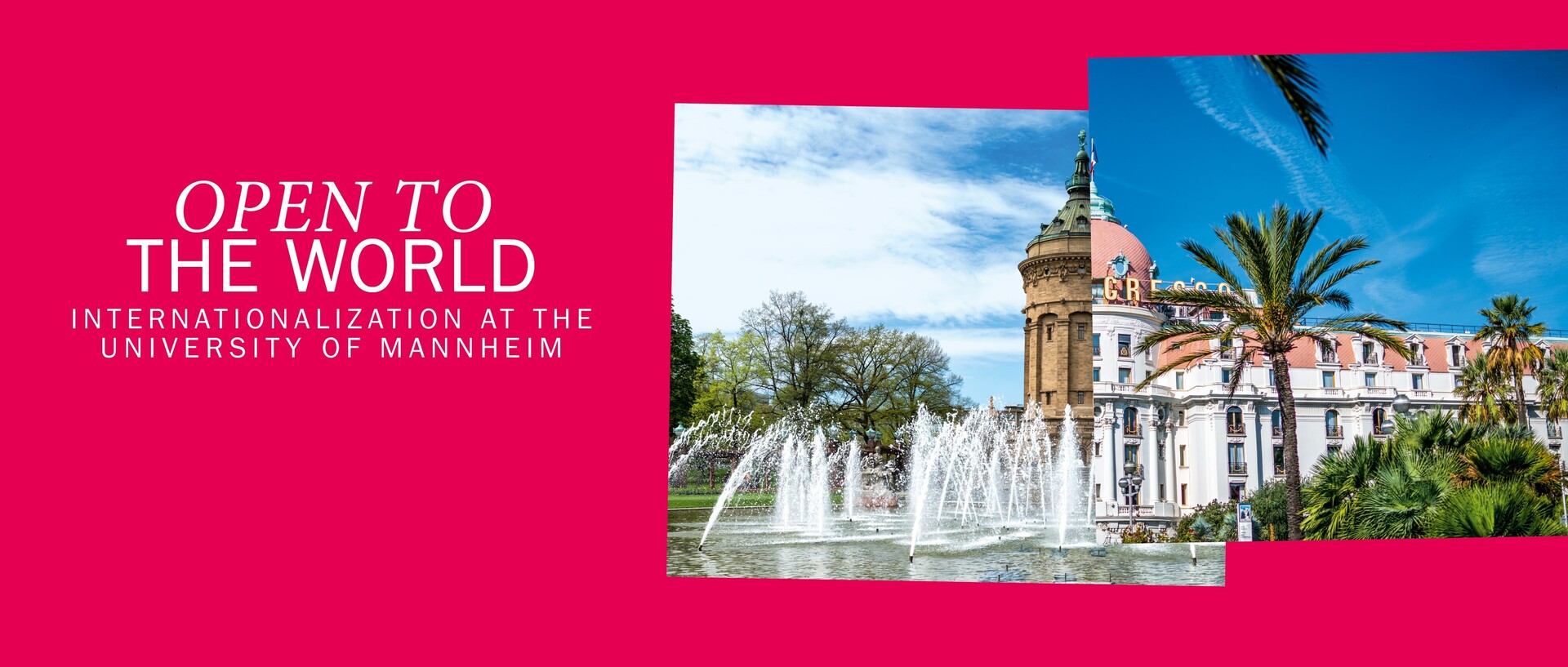“Despite Growing Challenges, I Am Optimistic about the Future.”
Professor Thomas Fetzer has been Vice President for Strategic Planning, Internationalization and Equal Opportunity for one year now. He assumed the coordination of the European university ENGAGE.EU this summer. FORUM spoke to the legal expert Professor Fetzer about the importance of internationalization at the University of Mannheim and ongoing developments in this area.

FORUM: What significance does internationalization have for the University of Mannheim?
Fetzer: Internationalization has already been one of the defining features of the University of Mannheim for quite a long time. We want to keep improving our teaching and research all the time and that means that we need the best minds at the University of Mannheim. We can’t find them in Germany alone and must compete for them internationally. We also have a responsibility toward our students to enable them to become Europeans and to become open-minded, cosmopolitan people with broad horizons. Opportunities to study abroad flow into that, for instance, but it also matters that we have a campus here that is internationally oriented, not least through the provision of countless courses with English as a language of instruction, and that affords wide-ranging opportunities to interact with students from all over the world. Finally, international cooperation between scholars at the level of research is immensely important. It boosts our international visibility and feeds into perceptions of us as an excellent partner for international projects as well. Science diplomacy merits mention in this context, too: When every other diplomatic channel is blocked or appears to be on the verge of collapsing, contact between researchers is often one of the last workable options.
FORUM: How does the University of Mannheim stack up against other universities when it comes to internationalization?
Fetzer: For a university of our size, we are very international indeed. We have about 450 partner universities and high rates of outgoing and incoming students. We have a campus that is largely bilingual and, most importantly, the mentality is there. People are aware of internationality everywhere you look—in the President's Office and the administration as well as among students and teaching staff. We are always among the front runners in the annual evaluation of the progress of internationalization at universities carried out by the German Academic Exchange Service (DAAD), the German Research Foundation (DFG), the German Rectors’ Conference (HRK), and the Alexander von Humboldt Foundation. We are starting from a very good place.
FORUM: Recently, major funding providers have reduced the level of financial backing they provide. They include the Federal Ministry of Education and Research and the Federal Foreign Office, which is a relevant source of funding for bodies including, for instance, the German Academic Exchange Service (DAAD) and the Alexander von Humboldt Foundation. How significant will this be?
Fetzer: It was clear to everyone involved that Covid, the economic crisis, and war mean that money is getting tighter. But I think it is disastrous that the very first areas to be hit by cuts are research and education and with them also internationalization. Specific programs at the University of Mannheim are affected by the funding cuts made by the German Foreign Office and the Federal Ministry of Education, for instance some scholarships for doctoral students that will no longer exist. We are determined to continue strengthening internationalization, but we will have to manage with less money. This means that we will have to become more creative. International mobility can be an important factor for career success not only for our students, but also and especially for our early-stage researchers.
FORUM: Do you already have specific ideas in mind?
Fetzer: Using digital technologies to strengthen internationalization is one thing I believe we can do. We saw during the Covid pandemic that it can work. COIL courses are a case in point. COIL stands for Collaborative Online International Learning; these are courses that are taught in digital formats jointly by two instructors from different international universities and open to students from both universities. Lots of experimentation is currently underway in this area and that is a positive development.
Another thing we must work on is putting systematic efforts into acquiring more funding at the European level to support research and exchanges. And going beyond that, we need to think about how to involve society as well. The Ukraine Emergency Fund set up by the University of Mannheim Foundation is a good example for this. It is obvious, of course, that society cannot absorb the costs of everything that government funding no longer covers. But we need to broaden our horizons across the board. And we need to engage even more concretely in dialog with our international partners while considering how we can cooperate to make attractive programs financially viable. Those are just a few approaches.
FORUM: Apart from the challenges presented by cuts to funding, the issue of science diplomacy has also become trickier recently, partly because of the war in Ukraine. Are you nevertheless optimistic about the future?
Fetzer: Research cooperation has indeed been becoming more difficult. Problems don’t only arise in connection with countries like Russia or China; we have been seeing some isolated cases in Europe, too, and there were some issues with cooperation with the United States while the last administration was still in power. I am nonetheless optimistic about the future because I see the desire, the urge and the readiness that is present in the scientific community, even in challenging states, to keep research cooperation going – even when it means accepting personal risks or disadvantages – because everyone involved in it realizes how much it matters. International exchanges in research and science contribute to stabilizing democracy and the rule of law by, for example, providing a solid base of evidence that can support political decision-making.
FORUM: What are your special focus areas as Vice President for Internationalization?
Fetzer: Ensuring that internationalization is embedded even more broadly in the next strategic plan is one objective. And we will continue to have high aspirations about how many students we can send abroad. ENGAGE.EU, the European university alliance coordinated by the University of Mannheim, is a further focus area. It is important to me that ENGAGE.EU is integrated into the overall internationalization of the University of Mannheim as one major component. In addition, I think it is important that we become even more involved in international networks. The university president, Professor Thomas Puhl, has been elected to the Presidential Steering Committee of U7+, an alliance of international universities that came into being after the G7 meeting in France. Networks like that are becoming more important. And my final point would be securing international research funding more successfully. We have already acquired a string of ERC grants, a very prestigious funding line awarded by the European Research Council. But we can become even more effective in that area. There are many relevant and attractive opportunities to secure funding at the European and international levels that we could exploit even more effectively than we are doing at present.
Interview: Katja Bauer / October 2022
